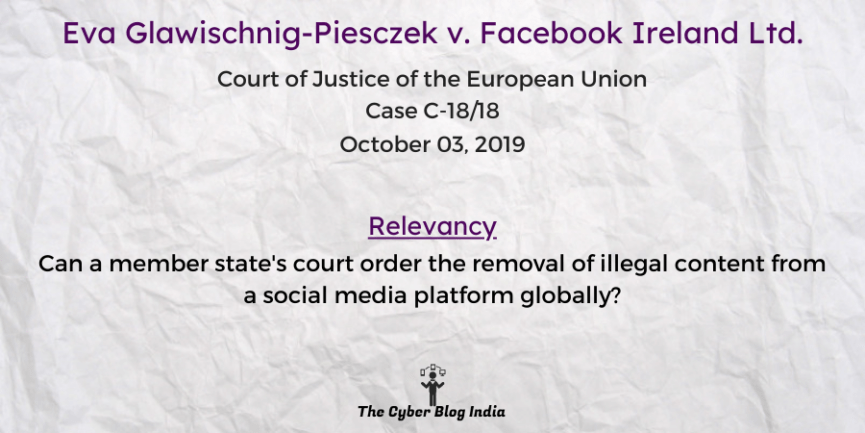Eva Glawischnig-Piesczek v. Facebook Ireland Ltd.

Eva Glawischnig-Piesczek v. Facebook Ireland Ltd.
In the Court of Justice of the European Union
Case C-18/18
Before the members of the Third Chamber
Decided on October 03, 2019
Relevancy of the Case: Can a member state’s court order the removal of illegal content from a social media platform globally?
Statutes and Provisions Involved
- EU Directive on Electronic Commerce, 2000/31/EC (Article 14, 15, 18)
Relevant Facts of the Case
- In this case, the applicant is a former federal chairperson of the Greens, an Austrian parliamentary party and a member of the National Council in Austria. The defendant is Facebook Ireland Limited, which operates Facebook for users outside the USA and Canada.
- On April 03, 2016, a Facebook user shared an article from an Austrian online news magazine. This user published a comment calling the applicant a lousy traitor and corrupt bumpkin and labelling her party a fascist party. Any Facebook user could access this post and comments.
- On July 07, 2016, the applicant asked Facebook to delete the post and reveal the user’s identity. However, Facebook did not accept her request.
- Thereafter, she approached the Commercial Court in Vienna, claiming her right to control the use of her own image under Section 78 of Urhebergesetz (Austrian Law on the protection of copyright). She also claimed an infringement under Section 1330 of the Austrian Civil Code. Section 1330 deals with defamation.
- The Commercial Court ordered Facebook to cease and desist from publishing the claimant’s photograph and accompanying defamatory comments. Facebook disabled access to this post in Austria.
- An appeal was filed before the Higher Regional Court in Vienna. The court upheld the order; however, Facebook can only disable access to content brought to its notice by the claimant or any third parties. Both parties appealed this judgement to the Austrian Supreme Court.
- The Austrian Court referred two questions to the Court of Justice of the European Union (CJEU). First, does an injunction under Article 15 extend to statements that are identical or have equivalent content? Second, can such an injunction apply worldwide?
Prominent Arguments by the Counsels
- Before the Austrian courts, the defendant’s counsel argued that Austrian laws do not apply to Facebook. Only Californian law (due to its headquarters in California) and Irish law (European base) are applicable. Facebook also claimed host-provider privileges under the European Community’s E-Commerce Directive.
- In 2019, the Advocate General of CJEU issued an advisory opinion on these issues. He observed that Article 15(1) did not regulate the territorial scope of an obligation. Therefore, it does not preclude a member state from issuing injunctions against hosting providers. The scope of these injunction orders would cover filtering identical or equivalent information globally. However, Article 15 prohibits general monitoring obligations. Hence, the injunction can only cover identical or equivalent information published by the same user.
Opinion of the Bench
- Article 14(1) of the Directive exempts information service providers from liability insofar as they do not have knowledge of any illegal activity. Once they become aware, they must act expeditiously to remove or disable access to the content in question. Under the umbrella of this framework, national authorities and courts may establish procedures to remove or disable illegal content.
- “Equivalent information” is content which essentially conveys the same meaning but is worded slightly differently.
Final Decision
- The Directive does not preclude a member state from ordering a hosting provider to remove information declared unlawful. Moreover, they can order the removal of identical or equivalent information posted by any user. Monitoring for identical illegal content will fall within the allowance for monitoring in a specific case.
- Article 18(1) does not make a provision for any territorial limitation for the effects of such injunction orders. It is up to a member state to determine the geographic scope of the restriction.
- The court remanded the case back to the Austrian Supreme Court to proceed further after considering the outcomes of this preliminary ruling.
